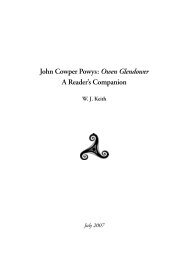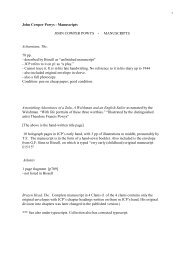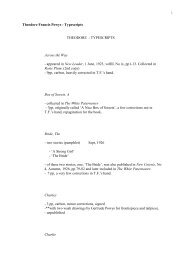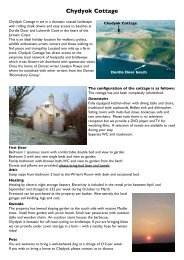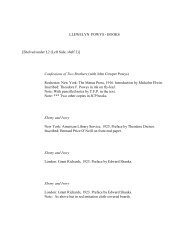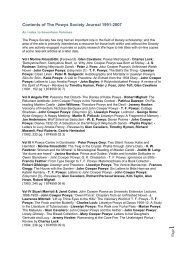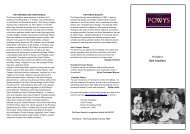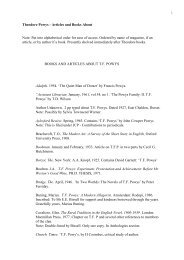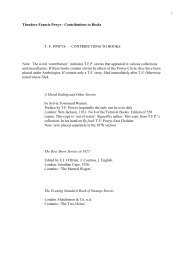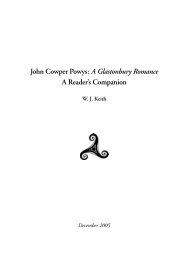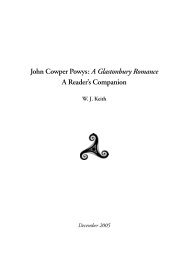J. C. Powys' Autobiography: A Reader's Companion - Site POWYS
J. C. Powys' Autobiography: A Reader's Companion - Site POWYS
J. C. Powys' Autobiography: A Reader's Companion - Site POWYS
You also want an ePaper? Increase the reach of your titles
YUMPU automatically turns print PDFs into web optimized ePapers that Google loves.
12 <strong>Autobiography</strong><br />
Brunswick Terrace (15, 18) — A terrace on the<br />
Esplanade at Weymouth, where JCP’s paternal<br />
grandmother used to live (see “Penn House”). It<br />
appears in Wood and Stone (575, 702), Wolf<br />
Solent (26, 502), and Weymouth Sands (25, etc.).<br />
“brutish sting” — See “the brutish sting.”<br />
Brutus (122) — One of the conspirators who<br />
assassinated Julius Caesar, best known through<br />
Shakespeare’s Julius Caesar. See also Dante’s<br />
Inferno (Canto 34).<br />
Bruton (333) — A small town in Somerset, some<br />
fifteen miles northeast of Montacute.<br />
Brympton House (116) — Almost six miles<br />
southeast of Montacute. The owner of Montacute<br />
House in JCP’s time had married a daughter of<br />
the Ponsonbys of Brympton; see an unpublished<br />
letter from JCP to Constance Vulliamy (16 April<br />
1959) in the Fisher Rare Book Library, University<br />
of Toronto.<br />
Buck, Dr. (632) — In fact, R. M. Bucke (1837–1902),<br />
student of mysticism, admirer of Walt Whitman,<br />
and author of Cosmic Consciousness (1901).<br />
Buddha (628, 630, 639) — Popular name for<br />
Sidhartha Gautama (c.553–483 BC), founder of<br />
Buddhism. Buddha means “the Enlightened<br />
One.” So, “Buddhistic” (642).<br />
Budge-Fudge (196) — Clearly a slang term,<br />
probably with a sexual meaning, but not traced.<br />
Bulwer-Lytton (104) — Edward Robert Bulwer-<br />
Lytton (1831–1891), English author, best known for<br />
The Last Days of Pompeii (1834).<br />
“bum-gut” (410) — The expression occurs five<br />
times in Rabelais (Book1), referring to the rectum<br />
or anus, according to the context.<br />
“bundling” (365) — Sleeping in the same bed for<br />
warmth. Sir John Rhys mentions this as an old<br />
Welsh custom (Studies [175]). See also Maiden<br />
Castle (231).<br />
Burdon Hotel (187) — Once an extremely<br />
fashionable hotel on the Esplanade at Weymouth,<br />
mentioned in Wolf Solent (551, where it is<br />
incorrectly spelt “Burden”) and Weymouth Sands<br />
(33). JCP and Phyllis Playter stayed there for one<br />
night—which they did not enjoy—in August 1934;<br />
see The Dorset Year (66). The “Burdon bus” (646)<br />
transferred passengers and/or luggage to and<br />
from the railway-station.<br />
Burpham (175) — Village near Arundel in Sussex<br />
where JCP lived after his marriage (ch.8). For<br />
photos of house and church, see Powys Review<br />
24 (1989), 40, and Powys Journal 4 (1994), 92.<br />
Burton, Thomas (348) — In fact, Robert Burton<br />
(1577–1640), English prose-writer best known for<br />
The Anatomy of Melancholy (1621). “Thomas” is a<br />
slip on JCP’s part.<br />
“But all the same ...” — See “all the same ...”<br />
But not in this soil (386) — From Milton’s Comus<br />
(l.633).<br />
But the lecture fell flat (342) — Not according to<br />
Louis Wilkinson, who described it as “one of the<br />
most eloquent that I ever heard him give” (Welsh<br />
Ambassadors [63]).<br />
Butcher (387) — S. H. Butcher, who translated<br />
Homer’s Odyssey with Andrew Lang (q.v.) in 1879.<br />
This is the translation recommended by JCP in<br />
One Hundred Best Books (19).<br />
“By Gis and by St. Charity” (341) — From<br />
Shakespeare’s Hamlet (IV v 58), also quoted in<br />
Suspended Judgments (209) and In Spite Of (179).<br />
The first part of the line also seems to be quoted<br />
in Owen Glendower (207). In Letters to Ross (13),<br />
it occurs as “by Chrish and by St. Charity.”<br />
Bynner, Witter (648) — American poet (1881–1968)<br />
who sometimes collaborated with A. D. Ficke<br />
(q.v.).<br />
Byron (305, 392, 407) — George Gordon, Lord<br />
Byron (1784–1824), British poet best known for his<br />
romantic lyrics and for his satiric comic epic Don<br />
Juan. “Byron’s Pool” (166) is a popular bathingplace<br />
near Cambridge. JCP wrote an essay on<br />
Byron in Suspended Judgments.<br />
C<br />
Cabell, Mr. (511) — James Branch Cabell<br />
(1879–1958), American novelist best known for<br />
Jurgen (1919).<br />
Cadbury Camp, Cadbury Castle (89, 462) — An<br />
encampment northeast of Montacute, also<br />
mentioned in Wood and Stone (133), where it is<br />
called “the authentic site of the Arthurian<br />
Camelot.”<br />
Cader Idris (189) — A Welsh mountain in modern<br />
Gwynedd.<br />
Cadmus (223) — A legendary Greek hero who,<br />
after slaying a monster, flung its teeth behind<br />
him; from them sprang up armed men.<br />
Caerleon [-upon-Usk] (208, 291) — A place where<br />
King Arthur is said to have held court in southeast<br />
Wales.<br />
Caesar (393, 502) — Julius Caesar (q.v.). So,<br />
“Caesarian” (369).<br />
Caesar Augustus (122) — The first Roman<br />
Emperor (63 to14 BC), Emperor from 27 BC.<br />
Caesar Borgia (284) — More correctly Cesare<br />
Borgia (c.1476–1507), Italian churchman, soldier<br />
and statesman, the model for Machiavelli’s The<br />
Prince despite his dubious political career.<br />
Cagliostro (339, 366, 410, 447, 484, 489, 519; cf.<br />
261) — Alessandro Cagliostro (1743–95), an Italian<br />
impostor who dealt in elixirs and love-potions.<br />
He was also involved in the Diamond Necklace



